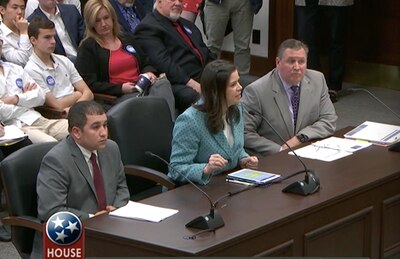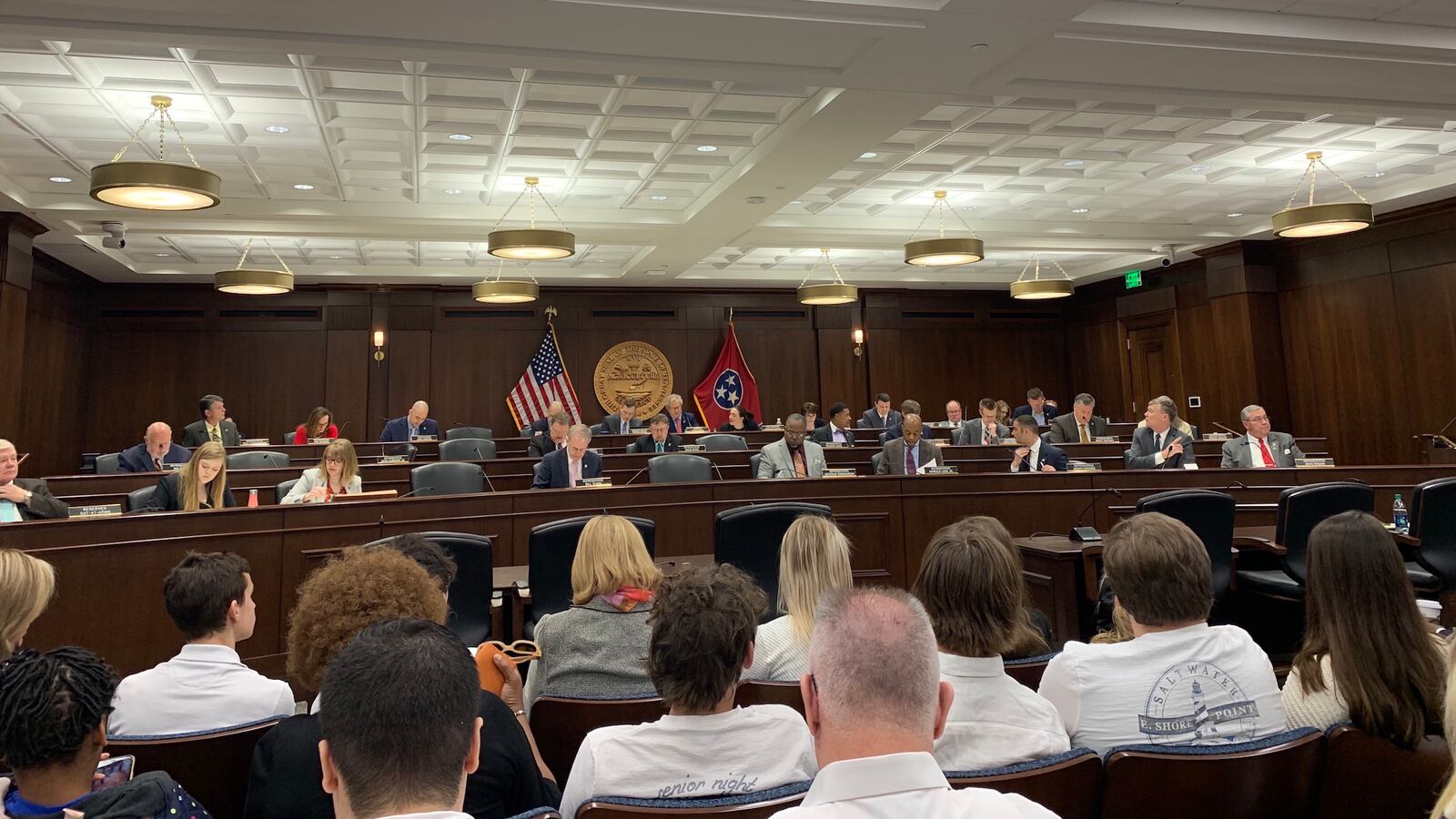Gov. Bill Lee notched a significant win Wednesday as a key legislative committee advanced his controversial education voucher proposal.
The Republican governor’s plan to bring an education savings account program to Tennessee cleared its second hurdle in the General Assembly in a committee where voucher legislation has stalled in previous years.
The 14-9 vote, with one abstention, came after two hours of discussion in the House Education Committee and sends the bill next to the government operations panel. The Senate has not yet taken up the proposal but has approved voucher bills three times in recent years.
Wednesday’s vote marked a victory for the new governor who — boosted by a comfortable election win and a Republican supermajority on Capitol Hill — has enthusiastically taken up a cause that has come up short for years in Tennessee’s legislature.
“It’s very student-focused. It’s something that Gov. Bill Lee ran on. He was elected by over 20 percent margin of victory,” said Rep. Bill Dunn, explaining why he is shepherding the governor’s legislation in the House.
Here’s why voucher advocates are excited about Tennessee this year
Even so, Lee’s administration and House Speaker Glen Casada had to twist some arms and make several changes to the legislation this week to appease lawmakers fielding angry calls from public school teachers, leaders, and advocates back home.
Those changes include removing home-schooled students from being able to enroll, capping the program at 15,000 students, and requiring the state education department to produce a report on student enrollment and performance after the first year instead of following year three.
Lee says his plan would give parents more education choices for their children, especially for low-income families whose kids now attend low-performing schools. After the vote, he praised the House committee for giving his proposal momentum.
“Education savings accounts put students first, strengthen our public education system, and provide choices for those who need it most,” the governor said in a statement.
However, the way the legislation is written, more middle-class than low-income families could end up receiving an average of $7,300 in taxpayer funds annually to pay for private education services. That’s because eligible families could make double the income that is required federally to receive free and reduced-price school lunches — amounting to up to $77,000 for a family of three or $93,000 for a family of four.
“If we care about low-income students, we should only qualify students whose families are eligible for free lunch,” said Jenny Hill, a school board member in Chattanooga, who spoke to the committee. “This bill, with this income qualifier, does not make it a low-income bill. It makes it a middle-class entitlement bill.”

Her district, Hamilton County Schools, is one of six whose students would be eligible because they have three or more schools performing in the state’s bottom 10 percent. Public school students in Memphis, Nashville, Knoxville, and Jackson also would qualify.
Dunn and other supporters never addressed Hill’s point. But at least one lawmaker said even an imperfect voucher program is worth trying in a state where other education experiments have been credited with academic gains
“I do not think that this legislation is the answer, but I do believe that it deserves a shot,” said Rep. Chris Hurt, a Republican from Halls and a former high school teacher.
The program would start with up to 5,000 students beginning in the fall of 2021 and could grow annually to up to 15,000 students in its fifth year. The cap was a concession this week by the governor whose first proposal would have allowed the program to grow by up to 2,500 students annually for the life of the program.
Rep. Scott Cepicky praised the governor for making revisions based on feedback from lawmakers.
“I do not know if this ESA program is the silver bullet in education. I know I believe in the drive and passion of Gov. Lee and his desire for Tennessee to be great,” said Cepicky, a Republican from Culleoka who called the proposal “too important to die here today.”
Critics countered that the governor’s plan would open the door to higher enrollment later.
“As I’ve seen in other states, once you start as a pilot, inevitably it has a tendency to grow,” said Jim Wrye, lobbyist for the Tennessee Education Association, the state’s largest teacher organization.
Others argued that taking students and money from already underfunded public schools isn’t the answer in Tennessee, where districts in Memphis and Nashville have sued the state over the adequacy of school funding. That 3½-year-old lawsuit is scheduled to go to court later this year.
“I would simply ask this group to look at the funding in Tennessee schools before we take funding out of our schools,” said Dale Lynch, speaking in behalf of school superintendents.
Lee wants taxpayer money from state and local governments to follow students who receive education savings accounts — as much as $125 million by 2024. To offset any losses, he is setting aside $75 million for public school systems in the first three years. After that, he proposes $25 million in recurring grants to improve struggling public schools.
Representatives of several pro-voucher groups and a private school were among those who spoke in favor of Lee’s plan.
“I’m coming to beg for the students that need help that are not being served in the schools that they’re presently in,” said Don Holwerda, a former administrator at Chattanooga Christian School. “This is not an anti-public school bill. But right now, there are a number of students who are not being served in Tennessee, and I believe it’s time for a paradigm shift.”
The large committee room at the state Capitol was full for Wednesday’s meeting as teacher and advocacy groups mobilized voucher opponents to show up for the vote and contact committee members to voice their opposition.
Meanwhile, the pro-voucher Tennessee Federation for Children encouraged its followers to contact several Republican lawmakers on the committee including Rep. Charlie Baum of Murfreesboro. Baum has voted for the bill twice but, in subcommittee last week, he asked several pointed questions about the proposal, including why students who receive education savings accounts wouldn’t be required to take all of the same state tests required of their counterparts in public schools.
Tennessee lawmakers have debated the merits of vouchers for more than a decade, but those proposals always have stalled because Democrats and rural Republicans banded together in opposition. The closest the state got was in 2016 when a different voucher bill — also sponsored by Dunn — made it all the way to the House floor before he realized he didn’t have enough votes and pulled the measure at the last minute.
This year, Lee pledged to champion “parent choice” legislation and chose education savings accounts as his approach. While a traditional voucher can only be used to pay for private school tuition, taxpayer money in education savings accounts can go toward an array of other private education services too including tutoring, online courses, and even home computer equipment. Education savings accounts also poll better among voters than do vouchers.
Whether traditional vouchers or education savings accounts, House Minority Leader Karen Camper said most Tennesseans don’t want them.
“They want their tax dollars to go towards improving our public schools,” said Camper, a Democrat from Memphis. “School vouchers have been rejected for many years in the legislature. Conditions have not changed: vouchers are still not a solution for our children.”
Below, you can read the latest version of the bill.

